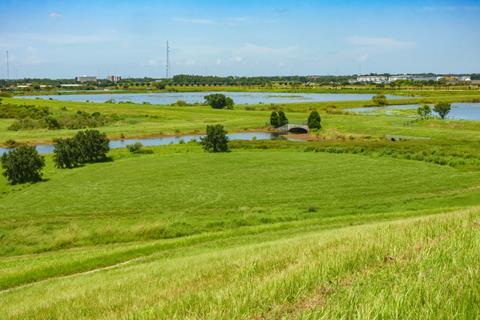But UK Green Building Council says small sites exemption risks 100,000 developments a year not providing for nature

Thousands of sites in England are to be left out of rules that will require developers to improve habitats on building sites.
Most developers will have to detail in planning applications how they intend to avoid loss and create new habitats on building sites from November this year, government guidance published yesterday confirmed. They will have to provide a 10% ‘Biodiversity Net Gain’ (BNG) - or positive benefit for nature.
But builders of smaller sites will have until April 2024 to “give them more time to prepare and apply best practice from activity on major development sites”, the Department for Environment, Food & Rural Affairs released yesterday said. Smaller sites are defined as under 10 homes where the site is under one hectare, or on plots of 0.5 hectares where the number of homes is not known.
The new rules came in the government’s response to its consultation on how to implement the biodiversity net gain policy mandated under the 2021 Environment Act, which said the policy must be brought in by autumn of 2023.
But Simon McWhirter, UK Green Building Council’s director of communications, policy and places, said extending the transition period for small sites meant the government risked “removing up to 100,000 developments a year from the scope of biodiversity regulations”.
This could mean “impeding nature’s recovery instead of supporting the industry with the clear, stable demand”, McWhirter added.
Environment secretary Therese Coffey said: “Biodiversity Net Gain will ensure new developments work for both wildlife and people by creating nature-rich places whilst ensuring that communities get the new homes they need.
“We will continue to support and work with developers and planning authorities ahead of the introduction of Biodiversity Net Gain.”
Housing secretary Michael Gove said: “Biodiversity is a vital part of our mission to create vibrant, green places that people are proud to call home.
“We want to make sure developers enrich local wildlife when delivering new homes and infrastructure across the country.”
The government promised under the Environment Act 2021 it would bring in the BNG rules and released its response to a consultation held from January to April last year along with the guidance yesterday.
It has also pledged to help local authorities in England deliver the policy with a £16m pot that they will be able to use to resource and upskill teams, including with ecologists. Councils will have to approve BNG plans before any development work can start on sites.
Builders will have to create new habitats on or off-site, or when they can not do this, as a last resort, buy statutory credits from the government and pay for improvements on other sites, Defra set out yesterday.
It will be possible to combine all three options to make up the BNG but proof will have to be given on why one option is not possible with the advice of an ecologist.
The government also said it would allow developers to sell excess biodiversity gains on sites for other developments, so long as the excess gain was registered and there was “genuine additionality for the excess units sold”. This move was criticised by campaign group Wildlife and Countryside Link, which said on Twitter: “This will effectively cap the ambition of BNG at 10%, rather than 10% being a minimum net gain.” Ecologist economist at the University of Oxford Sophus zu Ermgassen wrote on Twitter he thought this was “risky” because if a developer “overpromises what it will deliver on-site so that it gets up to near 110% within its development, then it can sell the ‘excess’ based on the artificial overpromise on the rest of the site”.
The government will consult further with stakeholders before BNG becomes mandatory in November, and draft legislation on the rules will be published later this year.
BNG rules will apply to all new housing, commercial and infrastructure developments. The government aims to halt and reverse species decline by 2030.











No comments yet